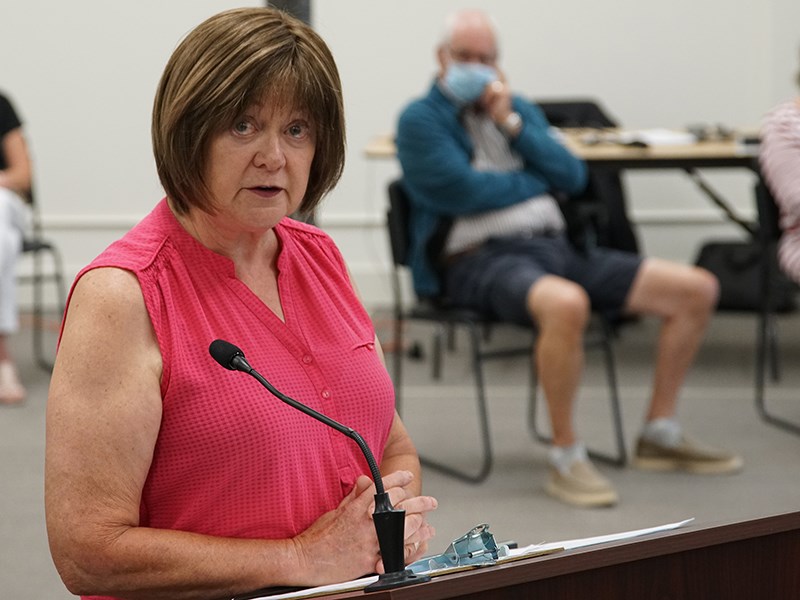A resident has requested that City of Powell River take leadership in making public-private partnerships more accountable.
The presentation was regarding PRSC, which was a partnership initially struck in 2006 by the city, Tla’amin Nation and Catalyst Paper Corporation to pursue development of approximately 800 acres of surplus lands owned by the mill.
At the June 18 city council meeting, Pat Martin said the intent of her presentation was to have something positive come from the city’s “costly experience with PRSC limited partnership.”
“In order to do that, I’d first like to share with you what I learned from examining PRSC’s finances and delving into its 12-year history,” said Martin. “It’s important you see the full financial impact of PRSC on our city so it might help guide your decision making, particularly since the city plans to commission a city-owned land use strategy and may be contemplating another public-private venture in the future.”
Martin said in summary, audits were not done for PRSC’s last 10 years of operation, including when it dissolved. Martin said only $223,000 of approximately $8.5 million in land sales revenue was audited over PRSC’s lifetime and the requisite annual audit waivers for the rest of the money were not done.
According to Martin, land sales to the general public amounted to less than $1 million and the remaining balance of approximately $7.5 million, close to 90 per cent of total land sales revenue on the books at dissolution, was from sales and distributions to PRSC’s shareholders.
“In simple terms, PRSC bought the lands from Catalyst, paid the taxes and expenses on them, and later sold/distributed most of them back to their own shareholders for a higher price and then claimed a profit,” said Martin. “In fact, PRSC was approximately $150,000 in the red before the 2018 fiscal year.
“If all PRSC-related expenses are factored in, I believe the city lost a lot of money through its involvement in the PRSC limited partnership. There are continuing losses because of the loss of property tax revenue on the lands now owned by the city.”
Martin said to fulfill the city’s information and council’s obligation to the taxpaying public to account for public monies spent, she was asking council to direct staff to produce final accounting of PRSC over its 12-year lifetime, including costs from all sources so it is clear how much money the venture cost residents of Powell River. She said the report should be made public and a reasonable date for its release would be November 1, 2020.
Martin said of note, PRSC was not able to sell most of the lands in 12 years, likely because of zoning constraints.
She said all costs considered, PRSC produced no real profits and the city would be ill-advised to get involved with another public-private partnership.
“Additionally, the city’s expectations that PRSC would spark economic development weren’t realized,” said Martin. “The only PRSC-attributable economic development that took place over 12 years appears to have been the building of Timberlane Estates subdivision, but the illegal road and resultant costs more than offset the city’s one-third share of the $260,000 PRSC gained through the sale.”
Martin said the city’s experience with PRSC identifies gaps in legislation related to public-private partnerships and a goal of her presentation was to ask council to seek legislative amendments through resolutions from the Union of British Columbia Municipalities.
The first was that audits be made mandatory for public-private partnership, with no provision to waive them.
The second was that new legislation be drafted so there is a mandatory requirement for transparency and accountability written into cities’ public-private partnerships.
The third was that the Freedom of Information Act be amended to include cities’ public-private partnerships.
“Given Powell River’s extensive experience with public-private partnerships, I believe the city would have a credible voice when asking for changes to provincial legislation,” said Martin. “I hope you will support this request to turn the PRSC experience into a catalyst for positive change.”
Councillor Cindy Elliott said she thought some of Martin’s recommendations made sense.
“I want to spend more time considering them,” said Elliott. “If we were to go the UBCM route we would obviously have to formulate resolutions to be put on the floor. I appreciate your attention to this.”
Elliott said she wanted council to receive the letter for future consideration around the proposed resolutions. Council agreed.



